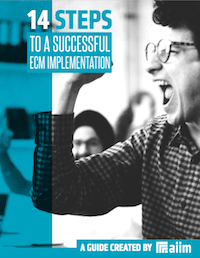The AIIM Blog
Keep your finger on the pulse of Intelligent Information Management with industry news, trends, and best practices.
Content Migration | Enterprise Content Management (ECM)
Organizations have a decision to make relative to the large volume of documents in existing legacy systems. The challenge is that organizations may have millions of documents. Which should be moved and which should stay where they are? What can be safely archived or deleted? According to a Forrester survey, only 7% of organizations surveyed have migrated all content to new ECM systems. The vast majority – 87% – retain some or most legacy content remains in old systems. Updating your infrastructure to take advantage of the benefits of a more modern-cloud-based structure requires a content integration platform – and one that is flexible enough to evolve over time.
Share
Enterprise Content Management (ECM)
How did we get here, and where do we go now? In the late 1990s, Enterprise Content Management became a mainstream technology (at least for large organizations) by first focusing on early adopters eager to automate high-value, mission-critical, and document-intensive processes critical to gaining competitive advantage. Organizations (and the suppliers who supported them) next applied ECM platforms to solving core back-office automation challenges – like accounts payable, invoice processing, contracts management, and HR administration. Over time, we began to think that ultimately, there would be a convergence in an organization around a single ECM platform.
Share

Making an ECM implementation successful requires planning and attention to detail. The best way to create the right solution is to identify organizational goals and priorities. Learn how to manage a successful implementation in our free guide.
Enterprise Content Management (ECM)
Most organizations finally believe that maximizing the value of content and information through a coherent information strategy is critical to their future in a digital world. Their information strategy requires a content integration platform, one that is flexible enough to evolve over time.
Share
Document Management | Electronic Records Management (ERM) | Enterprise Content Management (ECM) | Information Security
Too often, we look at documents as just pieces of paper or digital files that contain information. We often forget to consider the value of that document. Some documents are assigned value based on time to write (like a very large document) or potential fines if done wrong (like a regulatory or compliance document). But every document has some value.
Share
Content Services | Enterprise Content Management (ECM) | Intelligent Information Management (IIM)
Yes, I know "ECM" is supposed to be passé now. Per Merriam-Webster, the three definitions of passé are: past one's time outmoded behind the times Now I would be among the first -- and have been saying so for the past three years -- to say that the "ECM" term is in need of a makeover. Witness the work we have been doing regarding Intelligent Information Management.
Share
Content Migration | Enterprise Content Management (ECM)
Never have the risks of disruption – and the rewards of nimbleness and agility and creativity -- been higher. SaaS solutions to enterprise problems – with far fewer aches and pains to business types -- have swept through corporate America. For years, Boomers had the benefit of numbers – after all, they still represented the majority of the workforce and dominated the C-Level within organizations. By 2020, those pesky Gen X, Y, and Z folks will be 80% of the workforce. The Boomers – and the institutional knowledge they have – will largely be gone.
Share